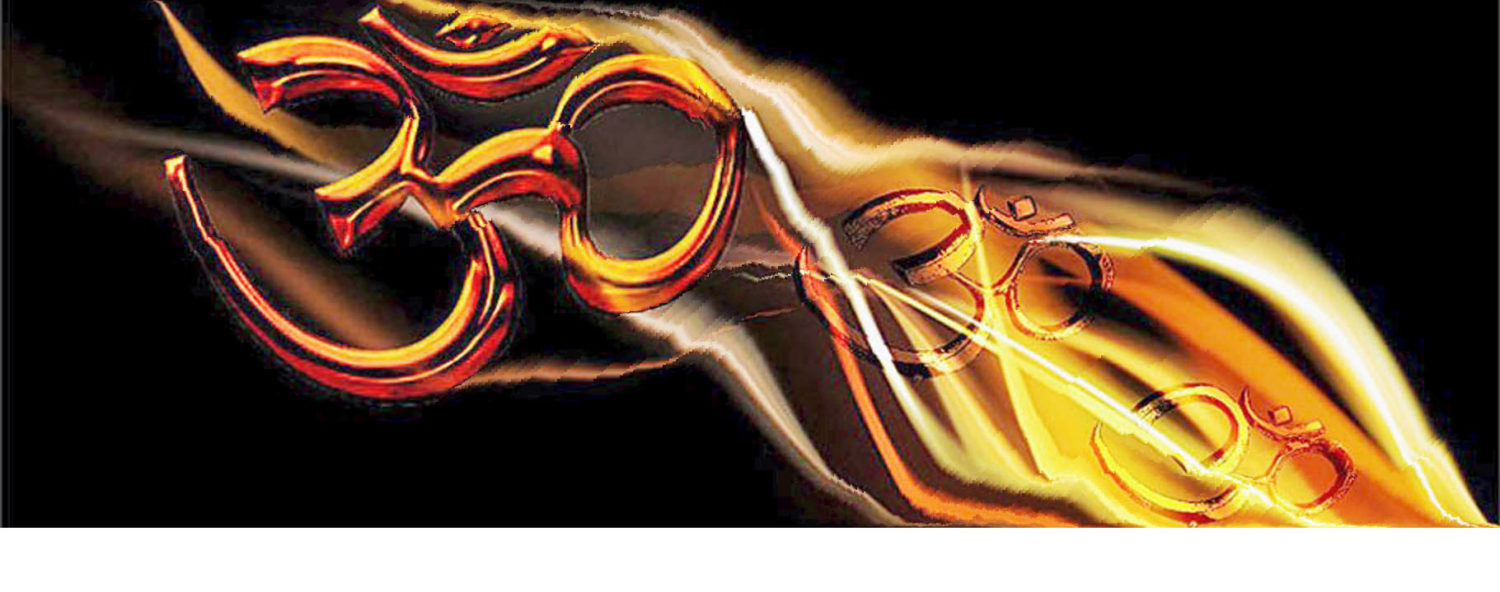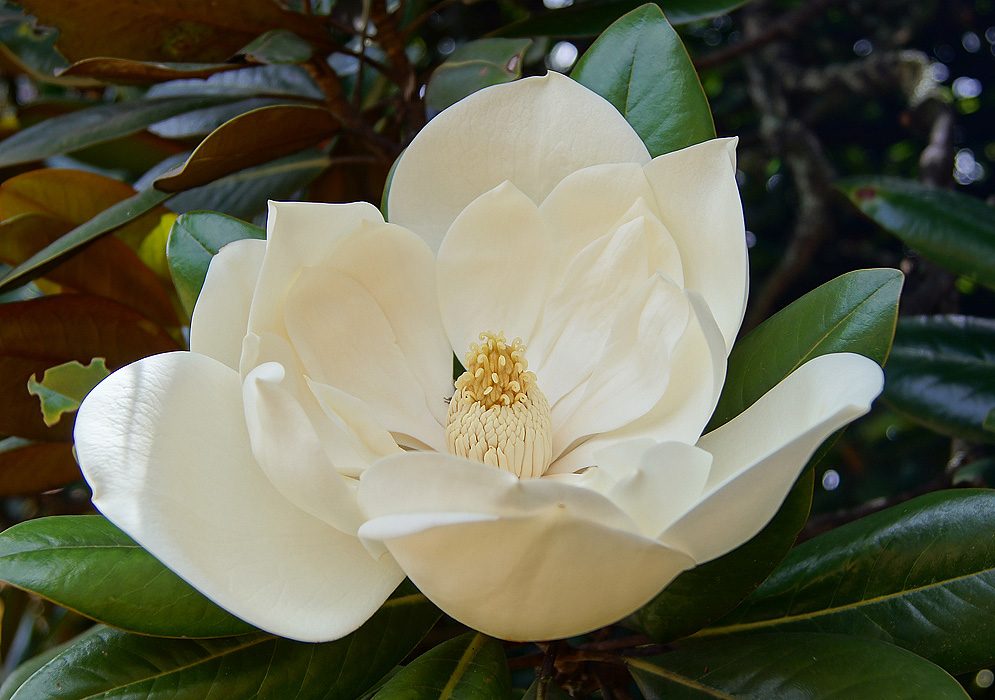Divine Grace is a powerful aid for Meditation
The conversation turned upon the question as to whether Iswara Prasad (Divine Grace) is necessary for the attaining of samrajya (universal dominion) or whether a jiva’s honest and strenuous efforts to attain it cannot of themselves lead him to That from whence is no return to life and death.
The Maharshi with an ineffable smile which lit up His Holy Face and which was all-pervasive, shining upon the coterie around him, replied in tones of certainty and with the ring of truth;
“Divine Grace is essential for Realisation. It leads one to God-realisation. But such Grace is vouchsafed only to him who is a true devotee or a yogin, who has striven hard and ceaselessly on the path towards freedom.”
4th February, 1935
Talk 29.
~~~~~~~~
An aristocratic lady looking very intelligent, though pensive, asked:
D.: Maharajji, I want to know how I can gain that peace of mind. Kindly be pleased to advise me.
M.: Yes – devotion and surrender.
….
D.: Am I worthy of being a devotee?
M.: Everyone can be a devotee. Spiritual fare is common to all and never denied to anyone – be the person old or young, male or female.
D.: That is exactly what I am anxious to know. I am young and a grihini (housewife). There are duties of grihastha dharma (the household). Is devotion consistent with such a position?
M.: Certainly. What are you? You are not the body. You are Pure Consciousness. Grihastha dharma and the world are only phenomena appearing on that Pure Consciousness. It remains unaffected. What prevents you from being your own Self?
….
D.: I mean meditation, etc.
M.: Yes. Meditation is on a form. That will drive away other thoughts. The one thought of God will dominate others. That is concentration. The object of meditation is thus the same as that of vichara.
….
As for Grace – Grace is within you. If it is external it is useless. Grace is the Self. You are never out of its operation. Grace is always there.
….
M.: Grace is the Self. I have already said, “If you remember Bhagavan, you are prompted to do so by the Self.” Is not Grace already there? Is there a moment when Grace is not operating in you? Your remembrance is the forerunner of Grace. That is the response, that is the stimulus, that is the Self and that is Grace.
There is no cause for anxiety.
….
D.: I should therefore remain in the world and engage in spiritual practice. Well, can I get realisation in this life?
M.: This has been already answered. You are always the Self. Earnest efforts never fail. Success is bound to result.
D.: Will Maharshi be pleased to extend Grace to me also!
Maharshi smiled and said “Um! Um!”
29th September, 1936
Talk 251.
~~~~~~~~
Mr. A. Bose, an engineer from Bombay, asked: Does Bhagavan feel for us and show grace?
M.: You are neck-deep in water and yet cry for water. It is as good as saying that one neck-deep in water feels thirsty, or a fish in water feels thirsty, or that water feels thirsty.
D.: How may one destroy the mind?
M.: Is there a mind in the first place? What you call mind is an illusion. It starts from the ‘I-thought’. Without the gross or subtle senses you cannot be aware of the body or the mind. Still it is possible for you to be without these senses. In such a state you are either asleep or aware of the Self only. Awareness of Self is ever there. Remain what you truly are and this question will not arise.
D.: Is the body consciousness an impediment to realization?
M.: We are always beyond the body or the mind. If however you feelthe body as the Self, then it is of course an impediment.
D.: Is the body or the mind of any use for the Self?
M.: Yes, inasmuch as it helps Self-realisation.
29th June, 1936
Talk 217.
~~~~~~~~
A Swami belonging to Sri Ramakrishna Mission had a very interesting conversation with Sri Bhagavan in the course of which Sri Bhagavan observed:
M.: Avidya (ignorance) is the obstacle for knowing your true nature even at the present moment.
D.: How is one to get over Avidya?
M.: Ya na vidyate sa avidya (What is not, is avidya). So it is itself a myth. If it really be, how can it perish? Its being is false and so it disappears.
D.: Although I understand it intellectually, I cannot realise the Self.
M.: Why should this thought disturb your present state of realisation.
D.: The Self is One, but yet I do not find myself free from the present trouble.
M.: Who says this? Is it the Self which is only one? The question contradicts itself.
D.: Grace is necessary for realisation.
M.: Inasmuch as you, being a man, now understand that there is a higher power guiding you, it is due to Grace. Grace is within you. Isvaro gururatmeti (Isvara, Guru and the Self are synonymous).
D.: I pray for that Grace.
M.: Yes, yes.
9th June, 1938
Talk 496
~~~~~~~~
The American Engineer asked: “Does distance have any effect upon Grace?”
M.: Time and space are within us. You are always in your Self. How do time and space affect it?
D.: In radio those who are nearer hear sooner. You are Hindu, we are American. Does it make any difference?
M.: No.
D.: Even thoughts are read by others. M.: That shows that all are one.
4th January, 1936
Talk 127.
~~~~~~~~
D.: What is Guru’s Grace? How does it work?
M.: Guru is the Self.
D.: How does it lead to realisation?
M.: Isvaro gururatmeti … (God is the same as Guru and Self …). A person begins with dissatisfaction. Not content with the world he seeks satisfaction of desires by prayers to God; his mind is purified; he longs to know God more than to satisfy his carnal desires. Then God’s Grace begins to manifest. God takes the form of a Guru and appears to the devotee; teaches him the Truth; purifies the mind by his teachings and contact; the mind gains strength, is able to turn inward; with meditation it is purified yet further, and eventually remains still without the least ripple. That stillness is the Self. The Guru is both exterior and interior. From the exterior he gives a push to the mind to turn inward; from the interior he pulls the mind towards the Self and helps the mind to achieve quietness. That is Grace.
Hence there is no difference between God, Guru and Self.
10th June, 1936
Talk 198.
~~~~~~~~
Mr. B. C. Das, the Physics Lecturer, asked: Contemplation is possible only with control of mind and control can be accomplished only by contemplation. Is it not a vicious circle?
M.: Yes, they are interdependent. They must go on side by side. Practice and dispassion bring about the result gradually. Dispassion is practised to check the mind from being projected outward; practice is to keep it turned inward. There is a struggle between control and contemplation. It is going on constantly within. Contemplation will in due course be successful.
D.: How to begin? Your Grace is needed for it.
M.: Grace is always there. “Dispassion cannot be acquired, nor realization of the Truth, nor inherence in the Self, in the absence of Guru’s Grace,” the Master quoted.
Practice is necessary. It is like training a roguish bull confined to his stall by tempting him with luscious grass and preventing him from straying.
Then the Master read out a stanza from Tiruvachakam, which is an address to the mind, saying: “O humming bee (namely, mind)! Why do you take the pains of collecting tiny specks of honey from innumerable flowers? There is one from whom you can have the whole storehouse of honey by simply thinking or seeing or speaking of Him. Get within and hum to Him (hrimkara).”
1st July, 1936
Talk 220.
~~~~~~~~
“Is a Master necessary for realisation?” Mrs. Piggot asked first.
M.: The realisation is the result of the Master’s grace more than teachings, lectures, meditation, etc. They are only secondary aids, whereas the former is the primary and the essential cause.
7th January, 1935
Talk 13.
~~~~~~~~
M.: Karma done unselfishly purifies the mind and helps to fix it in meditation.
D.: What if one meditates incessantly without Karma?
M.: Try and see. The vasanas will not let you do it. Dhyana comes only step by step with the gradual weakening of the vasanas by the Grace of the Master.
3rd October, 1935
Talk 80.
~~~~~~~~
Some ladies asked…
D.: What is Guru’s Grace? How does it work?
M.: Guru is the Self.
D.: How does it lead to realisation?
M.: Isvaro gururatmeti … (God is the same as Guru and Self …). A person begins with dissatisfaction. Not content with the world he seeks satisfaction of desires by prayers to God; his mind is purified; he longs to know God more than to satisfy his carnal desires. Then God’s Grace begins to manifest. God takes the form of a Guru and appears to the devotee; teaches him the Truth; purifies the mind by his teachings and contact; the mind gains strength, is able to turn inward; with meditation it is purified yet further, and eventually remains still without the least ripple. That stillness is the Self. The Guru is both exterior and interior. From the exterior he gives a push to the mind to turn inward; from the interior he pulls the mind towards the Self and helps the mind to achieve quietness. That is Grace.
Hence there is no difference between God, Guru and Self.
10th June, 1936
Talk 198.
~~~~~~~~
M.: The seer is only one. They do not appear without the seer. There is no change in the seer, however much the others may change.
Yogah karmasu kousalam = Skill in work is yoga,
Samatvam yoga uchyate = Equanimity is yoga,
Mamekam saranam vraja = Only surrender to Me,
Ekamevadwiteeyam = Only one without a second,
representing Karma, Yoga, Bhakti and Jnana convey the same meaning.
They are only the single Truth presented in different aspects.
Mr. Ekanatha Rao: Is Grace necessary for it? M.: Yes.
D.: How to gain Divine Grace?
M.: By surrender.
D.: Still I do not feel Grace.
M.: Sincerity is wanting. Surrender should not be verbal nor conditional.
Passages from St. Justinian were read out to illustrate these statements.
Prayer is not verbal. It is from the heart. To merge into the Heart is prayer. That is also Grace.
The Alwar says: “I was all along seeking Thee. But on realising the Self I find you are the Self. The Self is my all, and so you are my All.”
D.: Impurities of limitation, ignorance and desire (anava, mayika, and kamya) place obstacles in the way of meditation. How to conquer them?
M.: Not to be swayed by them.
D.: Grace is necessary.
M.: Yes, Grace is both the beginning and the end. Introversion is due to Grace: Perseverance is Grace; and Realisation is Grace. That is the reason for the statement: Mamekam saranam vraja (only surrender to Me). If one has entirely surrendered oneself is there any part left to ask for Grace? He is swallowed up by Grace.
7th January, 1937
Talk 319.
~~~~~~~~
D.: Is not grace more effective than abhyasa?
M.: Guru simply helps you in the eradication of ignorance. Does he hand over Realisation to you? D.: We are ignorant.
M.: Inasmuch as you say you are ignorant, you are wise. Is he a madman who says that he is mad? Guru’s Grace is like a hand extended to help you out of water, or it makes your way easier for the removal of ignorance.
…
D.: Is not Grace the gift of the Guru?
M.: God, Grace and Guru are all synonymous and also eternal and immanent. Is not the Self already within? Is it for the Guru to bestow It by his look? If a Guru thinks so, he does not deserve the name.
14th April, 1937
Talk 398.
~~~~~~~~
M.: Will-power or any other is gained by practice (abhyasa).
D.: Is success not dependent on Guru’s Grace?
M.: Yes, it is. Is not your practice itself due to such Grace? The fruits are the result of the practice and follow it automatically. There is a stanza in Kaivalya which says, “O Guru! You have been always with me watching me through several reincarnations, and ordaining my course until I was liberated.” The Self manifests externally as Guru when occasion arises; otherwise He is always within, doing the needful.
7th June, 1937
Talk 425.
~~~~~~~~
The Pandit asked about the operation of Grace. Is it the mind of the Guru acting on the mind of the disciple or anything different?
M.: The Highest Form of Grace is Silence (mowna). It is also the highest upadesa.
D.: Vivekananda has also said that silence is the loudest form of prayer.
M.: It is so, for the seeker’s silence Guru’s silence is the loudest upadesa. It is also Grace in its highest form. All other dikshas (initiations), e.g., sparsa, chakshus are derived from mowna (silence). They are therefore secondary. Mowna is the primary form. If the Guru is silent the seeker’s mind gets purified by itself.
D.: Is it proper that one prays to God or Guru when one is afflicted by worldly ills?
M.: Undoubtedly.
27th September, 1938
Talk 518.
~~~~~~~~
D.: What is the significance of Guru’s Grace in the attainment of liberation?
M.: Liberation is not anywhere outside you. It is only within. If a man is anxious for Deliverance, the Guru within pulls him in and the Guru without pushes him into the Self. This is the Grace of the Guru.
15th October, 1938
Talk 547.
~~~~~~~~
D.: Seekers who are in immediate proximity of the Master can get grace by darsana, sparsana, etc. (look, touch, etc.). But how does one get the same grace when the person is at a distance?
M.: By yoga drishti (yogic look).
14th December, 1938
Talk 591.
~~~~~~~~
D.: Doubts are always arising. Hence my question.
M.: A doubt arises and is cleared; another arises and that is cleared, making way for another, and so it goes on. So there is no possibility of clearing away all doubts. See to whom the doubts arise. Go to their source and abide in it. Then they cease to arise. That is how doubts are to be cleared. Atma samstham manah krtva na kinchidapi chintayet.
D.: Grace alone can help me to it.
M.: Grace is not exterior. In fact your very desire for grace is due to grace that is already in you.
1st February, 1939
Talk 618.
~~~~~~~~
M.: The Master is not outside you as you seem to imagine. He is within, is in fact the Self. Recognise this truth. Seek within you and find Him there. Then you will have constant communion with Him. The message is always there; it is never silent; it can never forsake you: nor can you ever move away from the Master.
Your mind is outgoing. Because of that tendency it sees objects as being outside and the Master among them. But the Truth is different. The Master is the Self. Turn the mind within and you will find the objects within. You will also realise that it is the Master who is your very Self and there is nothing but Him.
Because you identify yourself with the body you have accepted objects as being outside you. But are you the body? You are not. You are the Self. There are all the objects and the whole universe. Nothing can escape the Self. How then can you move away from the Master who is your very Self? Suppose your body moves fromplace to place; does it ever move away from your Self? Similarly, you can never be without the Master.
Mr. Lorey was struck by the answer although he was already familiar with the Master’s ways. He was even visibly moved. He prayed that the Grace of the Master might abide with him.
Sri Bhagavan: The Master being the Self. Grace is inseparable from the Self.
17th August, 1938
Talk 503.
~~~~~~~~






